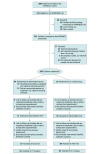Cognitive Training for Visuospatial Processing in Children Aged 5½ to 6 Years Born Very Preterm With Working Memory Dysfunction: A Randomized Clinical Trial
- PMID: 37676661
- PMCID: PMC10485729
- DOI: 10.1001/jamanetworkopen.2023.31988
Cognitive Training for Visuospatial Processing in Children Aged 5½ to 6 Years Born Very Preterm With Working Memory Dysfunction: A Randomized Clinical Trial
Abstract
Importance: Compared with term-born peers, children born very preterm generally perform poorly in executive functions, particularly in working memory and inhibition. By taking advantage of neuroplasticity, computerized cognitive training of working memory in those children could improve visuospatial processing by boosting visual inhibition via working memory.
Objective: To evaluate the long-term effect of cognitive working memory training on visuospatial processing in children aged 5½ to 6 years born very preterm who have working memory impairment.
Design, setting, and participants: This multicenter (18 French university hospitals), open-label randomized clinical trial with 2 parallel groups (EPIREMED) was conducted from November 2016 to April 2018, with the last follow-up during August 2019. Eligible children from the EPIPAGE 2 cohort were aged 5½ to 6 years, were born between 24 and 34 weeks' gestation, and had a global intelligence quotient greater than 70 and a working memory index less than 85. Data were analyzed from February to December 2020.
Intervention: Children were randomized 1:1 to standard care management and a working memory cognitive training program (Cogmed software) for 8 weeks (25 sessions) (intervention) or to standard management (control).
Main outcomes and measures: The primary outcome was the visuospatial index score from the Wechsler Preschool and Primary Scale of Intelligence, 4th Edition. Secondary outcomes were working memory, intellectual functioning, executive and attention processes, language skills, behavior, quality of life, and schooling. Neurobehavioral assessments were performed at inclusion and after finishing training at 6 months (intermeditate assessment; secondary outcomes) and at 16 months (final assessment; primary outcome).
Results: There were 169 children randomized, with a mean (SD) age of 5 years 11 months (2 months); 91 (54%) were female. Of the participants, 84 were in the intervention group (57 of whom [68%] completed at least 15 cognitive training sessions) and 85 were in the control group. The posttraining visuospatial index score was not different between groups at a mean (SD) of 3.0 (1.8) months (difference, -0.6 points; 95% CI, -4.7 to 3.5 points) or 12.9 (2.6) months (difference, 0.1 points; 95% CI, -5.4 to 5.1 points). The working memory index score in the intervention group significantly improved from baseline at the intermediate time point (difference, 4.7 points; 95% CI, 1.2-8.1 points), but this improvement was not maintained at the final assessment.
Conclusions and relevance: This randomized clinical trial found no lasting effect of a cognitive training program on visuospatial processing in children aged 5½ to 6 years with working memory disorders who were born very preterm. The findings suggest that this training has limited long-term benefits for improving executive function. Transient benefits seemed to be associated with the developmental state of executive functions.
Trial registration: ClinicalTrials.gov Identifier: NCT02757794.
Conflict of interest statement
Figures


References
Publication types
MeSH terms
Associated data
LinkOut - more resources
Full Text Sources
Medical
Miscellaneous

